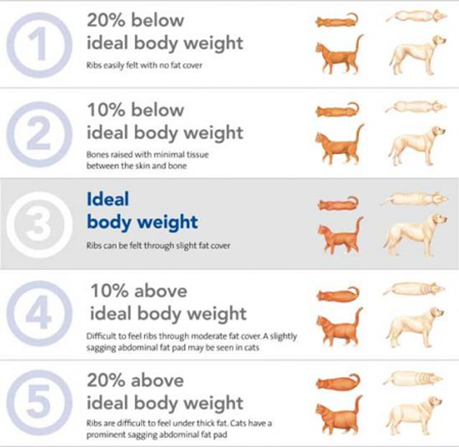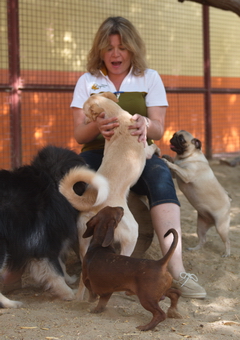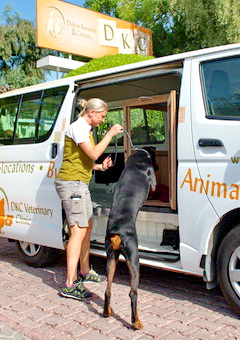weight loss or gain while boarding
Boarding your pet with us or another facility? ARE YOU CRAZY?!!!! DON'T YOU KNOW WE CAN'T BE TRUSTED?!!!!
Now, for those of you who are still reading this (anyone out there?), we want to give you the real poop about your pet losing or gaining weight while staying in a boarding facility for a while (how long is "a while"?... or a piece of kitty-string?). Dog weight loss and gain. Cat weight loss and gain. Life.. ain't it grand?
This is a looooong bit of reading... so go get your coffee.

Let's start with the obvious: Your pet's weight is one of the fundamental, important indicators of health. Surprised? Of course not.
But think a little more deeply and you get this: Your pet's weight is also one of the fundamental indicators of wellbeing. And don't kid yourself that a "he eats well" cat or dog is necessarily a happy chappy because you feed him all those "I love you" treats.
No, there's more to this than meets the pie-in-your-eye.
And there's a WHOLE lot more to all this when you board your pet in a boarding facility like ours, because it's almost certain that your Skinny Winnie and Chubby Tubs will come home having gained or lost a little weight (and maybe not just a little).
Often for the better, believe it or not.
Surprised? Of course not.

The first thing to understand and accept (can you accept?) is that, from a weight loss/gain point of view, being in boarding is not the same as being at home. (Never mind for now ALL THOSE OTHER REASONS in your worrying, loving mind as to why boarding is not the same as being at home. 
And one of the most influencing factors (though by no means the only factor) making that difference is... wait for it... YOUR mind. That's right. How you perceive your pet's weight and general health... how you worry about your pet when she's not in your own care... how you imagine your pet's day-in-the-life while in boarding... and how you trust or do not trust your experience with your pet care facility.
So, enough annoying, only slightly entertaining preamble. Let's get started.
weight loss ~ dogs
It's very important to distinguish between weight loss due to illness and weight loss due to increased stimulation and activity levels. The latter is very common in a good boarding environment because of the way your dog is being cared for.
It's also important to understand the difference between healthy and unhealthy weight loss. A significant and sudden decrease in weight, perhaps accompanied by weakness, for example, would obviously be unhealthy weight loss. But gradual weight loss which brings your pet down towards a weight which may not match your idea of ideal weight but in fact does get her closer to what vets and other experts think is ideal, can often be a natural result of being in the stimulating and active environment of a boarding facility. And it can be a good thing.
Think about it. What's healthier? Thinner (but not too thin) or chubbier (even if not too chubby)?
So, you leave your pooch with us for two weeks and you come back finding that he's lost weight. Why is that? Were the handlers (you thought you could trust) STARVING YOUR BABY!!!? Did they notice that he's lost weight?! You get upset and angry and think to yourself, "WHAT HAVE THEY DONE TO MY LOVEY-DOVEY!!!? He's never lost weight at home! WHAT HAPPENED!!!?" (Which you say to us very calmly and nicely, of course. 
So what did happened?
Weeellll... first of all, let's put aside health concerns: If your poochy-woochy had been ill during his stay with us, we would have contacted you long before your return, for sure. So let's assume, for a moment, that your pet is not ill and that we have not been negligent. (Tough to believe, we know.)
So then... what DID happen!?
Although there are many possible reasons, the first and most likely reason is, simply, ACTIVITY!
You see, in many homes, a dog's activity levels are limited to a walk or two during the day and, if you yourself lead an active life, you might take your pooch for a run every now and then. But have you ever considered what he does when you're not with him, running him around, when you're at work or elsewhere? What does he do?
You probably know the answer to this question but have never considered it in the context of what the difference is between life at home for Pooch and life at a boarding facility when he's there. The reality is that at home your Marley, Fluffy, Fido or Bruce (Bruce? Really?) is sleeping ~ most of the day, just about every day. Sure, he'll wake up now and again to get a bite to eat or bark at a bird or poo on your rug (no! not that!), but then he'll find his spot and snooze again... and again... and again... until you come back home (yay! you're home!). Of course each dog and each home differs, but generally speaking, sleep is what they do when you're not home to absorb (and encourage! admit it!) their endless doting, and so there's not a lot of stimulation otherwise. For most dogs, in most homes, on average. (That last bit is a we-are-doing-our-utmost-to-be-fair-and-balanced disclaimer.)

Now picture life at your local awesome kennels. At DKC, for example.
Your dog sleeps much much less (don't worry!) during the day (and even, to some extent, at night too). There is SOOOOOO MUCH going on ALL DAY LONG! Staff and visitors constantly moving around and back and forth... other dogs happily and excitedly bouncing and barking (and barking and BARKING) at every little thing... running around in our yards playing... and OH the smells and the birds and the distractions! It just never ends! And who would want it to?!
With all this going on, this constant sometimes-obvious, sometimes-not-so-obvious excitement, what do you imagine is the state of your poochy-poo's activity levels? That's right ~ pretty high; or at least higher than at home, and much more sustained than at home.
And this, in and of itself, can, and often does, result in weight loss. But a good kind of weight loss. The weight loss that comes from a good kind of activity level, where the smaller amounts of sleep and larger amounts of barking and excitement result in a pretty happy, and also energised, dog. Nice, right?
But if this is the case, and our staff are aware that your dog might lose weight during his stay with us because of all this extra, unusual excitement and activity, why don't we just increase your Rover's daily amount of food so that it matches the increased energy expenditure? Good question! Glad you asked.
Wish it was that simple.
You see, a sudden increase in your dog's daily food intake can result in digestion problems, so instead of helping him to maintain his current weight, doing this can actually end up causing weight loss because, in most cases, such a change will cause an upset stomach due to the sudden increase of food. Increasing or decreasing the amount of food your pet eats each day needs to happen gradually. What happens to us humans when we go on a binge-eating frenzy? That's right.
Furthermore, good weight loss can often be a result of good feeding practice... or should we call it regimented and more closely strictly prescribed feeding practice. What does THAT mean? It means that we are feeding quantities of food which come closer to what experts think your dog should be getting to eat per meal and per day, AND no treats most of the time (remember that piece of pie you fed your darling under the dinner table?). So, with reduced sweeties and treaties, and more carefully measured quantities at meal time, weight loss is often inevitable and... GOOD.
weight loss ~ cats
And what about cats?
Well, it's also very common for cats to lose weight too when they're out of their usual environment, but in their case it's not because of excitement or stimulation but rather because of stress. Sad but true, cats are homebodies and can be very territorial, so they will in many cases not enjoy the whole experience of being away from their home in the way dogs do. Now, although the stress they feel does not put them at risk, nor does it mean they are miserable, a cat away from home can become sufficiently stressed to cause it to lose weight. What does this mean? It means not eating or drinking much for, usually, the first few days when they join us, and this results, usually, in some weight loss. This said, even after a few days, once they've started to relax and settle in, they still might not eat as much as they do at home, which continues to contribute to the weight loss. Not LOTS of weight loss, understand, but grams ~ small amounts of weight which does not expose them to any kind of health risk (in almost all cases) but enough for us to notice the difference and, indeed, for you to notice the difference too once you come to collect them to take them home (which is when, of course, you freak out at us because WE'VE STARVED YOUR CAT!).

But here's the thing: some (many?) cats come to our cattery a little... uh... weightier than ideal. Sometimes their owners are aware of this (you?) but sometimes they are not (you?).
We know that feeding habits at home are different from the feeding habits in a cattery (and now you know too, right?). At home, most of us tend to fill a bowl of food for our cat in the morning because we love our cats and want them to have all they want and... sometimes... we feel guilty that we leave Meow-Face alone all day long ('tis true, 'tis true). Then we come back home after work carrying with us more love and... maybe some more guilt... so we give her more food! Then maybe a treat or two, and of course a little more wet food won't hurt anyone (will it?)... and all along we forget to count those calories and to consider the amount of food her body actually needs. And then Meow-Face turns into Meow-Fatty-Face. (Well, maybe only Chubby-Face. 
But in our cattery, food is given to our cats (and dog and birds and rabbits and everyone) based on the actual nutritional requirements for each pet as recommended by the producers of the food we use (or the food you give us), all based on their type and size and weight and age and activity levels... not based on anxiety or guilt (because we're sinister automatons, of course). It's ok, we're not judging here ~ we all do the same thing most of you do when it comes to our own cats.
This all said, some cats actually don't seem stressed at all when they're with us and yet they lose weight anyway. (Damn!) They're not overweight and they're not ill; in fact they are eating... so why the HECK are they losing weight?!
The problem with cats is that they are not good communicators (kind of like some humans). They might not be feeling well yet still eating and behaving something akin to normally. But a good appetite and behaving normally does not rule out illness. We see cats eating yet still losing weight because of thyroid problems, diabetes or chronic kidney disease. Conversely, Feline Hepatic Lipidosis (i.e. "Fatty Liver" disease) is a condition that affects the liver of cats which do not eat for extended periods of time and which can be life threatening in the worst cases. The irony here is that big or overweight cats are particularly at risk and this is why we're especially vigilant about a cat losing weight or not eating for a day or two as this condition can occur in situations of ongoing lack of appetite.
Oops! Scared now? Don't be. We're just telling you about the possibilities, not the probabilities.
weight loss ~ and so... what?
So when does weight loss become a concern? Is it when your dog or cat loses 100 grams, 200 grams, 1kg? Well, as you've by now gathered, the answer is not entirely simple or straightforward (which is why this entirely-too-long article has been written for you, by the way ~ are you still there?).
You see, we worry. We worry that you might not be aware of the whole weight-loss picture and that because of that lack of the whole picture, many of you will automatically consider weight loss in your pet after a boarding stay with us (or any kennels and cattery) as a bad thing, causing in you anxiety and distrust (and yelling and screaming and threats of bad-mouthing us on social media ~ it's ok, we're tough, we can take it). We do understand the anxiety and distrust because even we professionals are inclined to feel this way when it comes to our very own pets (regardless of our knowledge and experience), so we can certainly see how it all can affect you (except that we can't yell and scream at our colleagues, so you're rather lucky, actually, aren't you! 
But weight loss is not always a bad thing. When it IS a bad thing, it's not always as bad as we reflexively tend to feel, even if it is not a good thing in our particular pet's case; and often it's actually a good thing because, truth be told, so many pets are actually overweight without their owners realising it. And indeed, even when weight loss IS a bad thing because it's a really bad thing, it's often still a slightly good thing because it acts as an observable clinical symptom which prompts the necessary veterinary care, especially if our pet is regularly monitored and weighed, as any good kennels and cattery should be doing.

Weight loss seems like a small and clearly defined subject but there is a lot to know about it, so we of course do a lot of training with our handlers and, importantly, we work very closely with our veterinarians (or your veterinarian, if you're committed to a clinic other than DKC). Vets generally become concerned when the weight loss exceeds 15% of your pet's total body weight ~ this does raise an alarm bell for all involved. And indeed it should raise an alarm ~ but how frantic an alarm and what response to it? That's where the debate begins, not just generally speaking but in actual fact between our handlers and vets and nurses, as we figure out what might be at play and what response it requires. Do we rush your pet to the vet? Should we call you to discuss things? Should we act without disturbing your vacation or work? Is it nothing to worry about at all, or something indeed?
Tough, right?
And it gets tricky in part because vets, who are the holy sages of all knowledge (of course!) are not actually always best-placed to assess what should be done and whether or not there is actually a problem because they usually do not know the pet as well as our handlers do, and this is relevant and important. Remember, a kennel or cattery environment is not the same as home nor as a consult room, so there are insights that a good handler team can have which is very relevant for decision-making when your pet is staying in a boarding facility.

A simple example:
Marley, a 2-year-old chocolate Lab comes to board with us and his weight on arrival is considered "ideal". He is extremely active (hyper, as almost all Labs are!), plays a lot, runs a lot and is excited pretty much ALL THE TIME (geeezzz...). AND he eats EVERYTHING!
But... alas... Marley loses weight. 1.5kg in 1 week.
Bummer.
And why?! He's eating. He's happy. He's healthy, damn it!
If we strictly followed the generalised veterinary expert guidance on this, we would have to rush Marley to the vet to get him checked. But in fact we don't do this necessarily ~ certainly not in all cases. Why? Because although we are seeing some weight loss, we are seeing it in the real-time context of a happy, eating, playing, running dog with no signs of stomach upset or anything else adverse at all. We are also seeing... indeed we are encouraging and a part of... a significant increase in Marley's activity levels because he's now in a kennels, surrounded by and playing with other dogs almost constantly ~ and therefore the weight loss. Weight loss caused not by illness but by improving fitness and a whole lot of fun. Context is everything.
This does NOT mean we don't take any action at all ~ of course we do. But we don't get to worrying unless Marley shows signs of actual illness and/or we notice a decrease in his activity levels and appetite. Now don't get us wrong, that doesn't mean that we've never sent a dog or a cat to the vet to be checked because of weight changes. We certainly have and do. All this merely means that based on our experience, and real-time involvement with Marley and all our boarding pets, not all weight loss means "DANGER". Dealing with hundreds of pets every month (sometimes every week) has shown us that there are other factors which contribute to weight loss, and that this is not always something to be concerned about, though awareness IS always important. So what we need to do is first determine some sense of an ideal weight for that particular pet, discover reasons behind any weight loss, and act accordingly... if acting is necessary at all.
But here comes the hard part (yes, even harder than all the previous bumph we've written). Determining a healthy or "ideal" weight is almost impossible (so much for THAT theory!). Saying all dogs or all cats should weigh X kilos is like saying all pieces of string should be X centimetres long.
To get an idea of what a dog or cat should weigh, we could look it up in an authoritative table of ideal pet weights. However, nearly every such research guidance provides this important information in a range of weights, not as a specific single number. As you can quickly see, the "ranges" alone (never mind all the other things to consider) make determining ideal weight rather difficult. Nevertheless, here are some examples of weight ranges:
- Adult Labrador: 29-36kg
- Golden Retriever: 29-34kg
- Boxer: 22-30kg
- Bulldog: 18-22kg
- Beagle: 8-13kg
- German Shepherd: 34-43kg
That's for large and medium-size breeds. Small breeds?
- Yorkshire Terrier: 2-3kg
- Shih-Tzu: 4-7kg
- Dachshund: 3-5kg
- Miniature Poodle: 5-8kg

And for cats? It's even harder to determine for them and unfortunately it falls under "assessment based on experience", so we assess visually and through touch: are we able to feel the backbone and touch the ribs? If we cannot feel a cat's ribs without pressing, then there is too much fat. If the ribs are visible, then the cat is skinny. We look for a noticeable waist between the back of the rib cage and the hips when looking at the cat from above. Is there a "tuck" in the tummy? Is the abdomen going up from the bottom of the rib cage to the inside of the thighs?
An even more structured and ultimately reliable assessment of a cat's or dog's body condition, other than to simply aim for a certain weight, is to use a standardised body condition score approach ~ this enables us to assess, relative to a pet's body structure, how much body condition, or lack thereof, your pet has. This involves grading a condition from 0 to 5 and is based on, and an extension of, the process we just described above regarding the all-too-difficult-to-asses cat, but for dogs too.
See? Not easy at all. And certainly not straightforward.
We could go on and on (haven't we already?!) about "ideal weight" and "when to start being concerned" but the bottom line is this: we start to be concerned when we notice a decrease in weight, decrease in appetite, increase or decrease in water intake, decrease in activity, change in behaviour, etc. etc... all considered as a whole and all in context. We then start looking for the reasons and possible solutions if necessary. Moreover, it's important to ask if a pet lost weight gradually or suddenly. Weight loss that happens quickly can be a sign that your pet is sick. You see, two-thirds of a dog's body is water, so sudden weight loss may be caused by dehydration rather than by loss of fat. Sudden weight loss for a cat can mean serious issues such as diabetes, the development of fatty liver disease, or... etc. etc. And all this, taken as a whole, in context, is what starts to give us an insight into whether or not there is a bad kind of weight loss and what, if anything, it might mean from a healthcare point of view.
So what happens when your dog or cat first comes to board with us?
- Your pet is given the food specified by you or provided by us, depending on your choice; the daily intake is determined by our handlers based on size, breed, age and activity levels... and of course recommended servings from the manufacturer of the pets foods used.
- Toileting sheets (i.e. daily monitoring of food intake and toileting) are started immediately for your pet.
- If your pet is not eating well for a couple of days, our handlers start looking for reasons. Is it excitement, stress or because your pet doesn't like the food, perhaps?
- Once a handler figures out the reason (hopefully we figure out the reason!), we take action. Either reduce the levels of excitement by moving your pooch to a quieter area of our kennels, for example, or perhaps even to one of the offices to reduce the stress levels. Perhaps introduce other types of food (after checking with you first, of course). And any number of other possibilities, a process which can take days of trialling and error as we whittle down to what appears to be the reason for weight loss, and hopefully coming to sound conclusions about what to do about it, including communicating with you about all we're doing.
- And IF we've had to go through this process with your pet, and after what can be several or many days of working through possibilities, and finally when you come to collect your pet after a stay with us, your pet may well have lost weight... which is when YOU START YELLING AT US! Bummer.

weight gain
What about weight GAIN?
Most pet owners instinctively feel, somehow, that weight gain is OK, where weight loss is not. Loss means a health issue, gain means happy, robust, eating-well Charlie-Pooch and Frisky-Feline. Well... think again.
Weight gain in small amounts is just as harmless as weight loss in small amounts. But weight gain in significant amounts (how long is a piece of string?) is, and should be, as much a concern as it's counterpart, loss. In fact, weight gain can sometimes be MORE serious than weight loss for all sorts of medical reasons, the most common of which are canine hypothyroidism and Cushing's disease. Thankfully, weight gain can usually be dealt with rather easily... with a little regime of controlled dieting and adherence to RECOMMENDED portions... IF you can "stomach" denying those hungry, gorgeous pet-eyes when you're at dinner.
One possible reason for weight gain in pets who are boarding can sometimes be the good intentions of the boarding facility's handlers, especially less experienced ones. It's possible that they overfeed your pooch thinking that they're giving extra love and attention, just like you do at home (right?). Now, at DKC, you'll be happy to learn that when this happens we obviously, promptly smack the hell out of those staff members until they're dizzy. (Joking!)
But another reason for weight gain is underlying health issues. If this is the case, why does the underlying health issue manifest only once your pet is in the boarding facility? That's a legitimate question and the answer is simply because your dog or cat is experiencing enormous amounts of excitement and change, and indeed in some cases unwanted but inevitable stress, and this can sometimes contribute to lowering the strength and robustness of their immune system, which of course can also be an issue in cases of weight loss.
When pet owners select a boarding facility, their first thoughts are almost always on the way the place looks. How it makes them feel. And there is no doubt at all that this is very important for a number of reasons, on a number of levels. But it's also very important to keep in mind that how a place looks and feels to a human is in most aspects pretty much irrelevant to a pet because a pet's needs and indeed their pleasure and health are affected by things we humans often do not at first consider.
The bottom line, and the most important attribute of a boarding facility when it comes to your pet's wellbeing is... the quality of staff (the handlers) and their level of real animal knowledge, whether you're concerned about weight loss/gain or any other aspect of your pet's health and care.
Boarding facility handlers need to be trained to recognize the warning signs of a whole range of potential health problems in general, and among the most important are any issues with regard to weight gain/loss because this is such an important indicator of overall wellbeing. A facility's handlers also need to be able to work closely with capable veterinarians (which means good relationships with quality clinics) because veterinary-level knowledge will obviously be a very potent positive contribution to assessment and, possibly, treatment once a handler initially successfully identifies that a problem may exist and if indeed that problem goes beyond what any boarding facility could or should properly manage themselves.
So try to keep front-of-mind that the best boarding facility is not only one that makes you feel good, but one that has knowledgeable handling staff and well-managed processes for identifying and dealing with health-related problems that might arise.
Weight loss/gain is a very broad subject and, believe it or not, we could go on and on about it, even beyond this already lengthy reading you've just done (you are still here, right?). Our main aim has been to try to help you see a little beyond the first-thought obvious worries you understandably have, into some of the reasons behind weight changes in your pet while he or she is staying at a boarding facility. You see... we are very sensitive and get REALLY UPSET WHEN YOU YELL AT US!!










